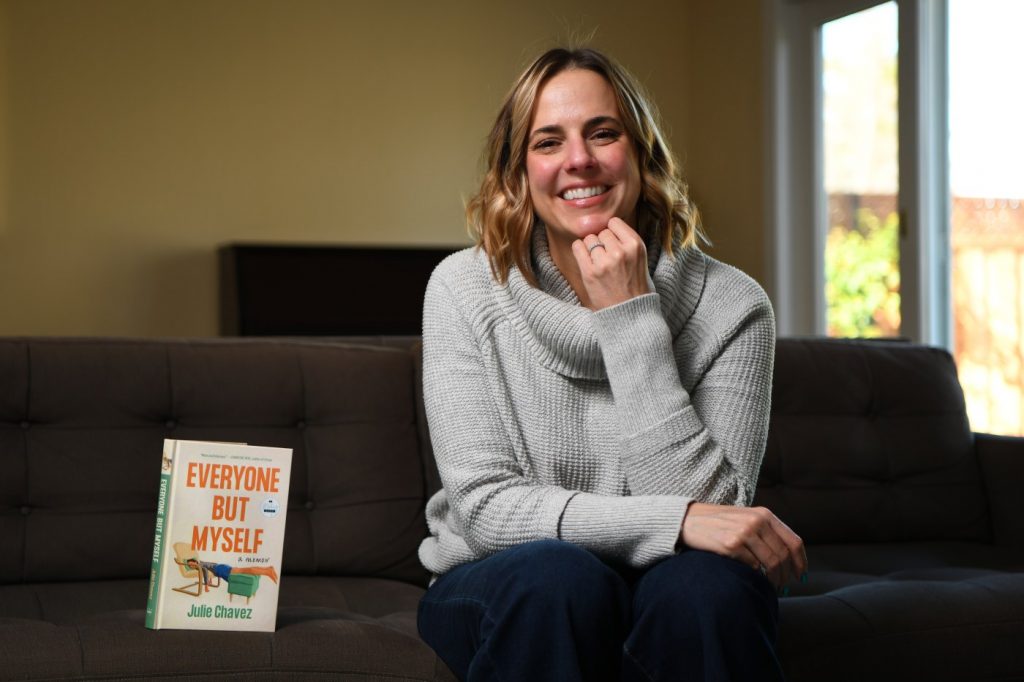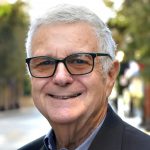Julie Chavez remembers the night in April 2018 when things went haywire. The elementary school librarian from Pleasanton calls it “The Night I Couldn’t Turn Off the Lights.”
Related Articles
Strange British comic for little kids is resurrected with new fans
Bay Area librarian and TikTok star Mychal Threets works to spread ‘library joy’
Prince Harry, Colleen Hoover top checkout lists for San Jose library
Barnes & Noble to locate new store in East Bay
Silicon Valley Reads tackles environmental sustainability
Her husband was away on business, and her sons, 9 and 11, were sleeping down the hall in the family’s otherwise cozy suburban home. But Chavez’s heart thumped “violently” in her chest, and she couldn’t calm her breaths. She thought she might die.
As Chavez, 44, writes in her new memoir, “Everyone But Myself” (Zibby Books, 240 pages) she was having a classic panic attack. She was convinced she would go into anaphylactic shock due to an allergic reaction; earlier in the day, she had been exposed to pollen at her son’s baseball game.
Even though some part of Chavez knew her fears were irrational, she couldn’t stop the racing thoughts. She managed to survive the night without going into the dreaded respiratory distress but woke the next morning realizing she desperately needed help.
Somehow, she had developed a major anxiety disorder, as she had tried to achieve “a perfectly happy life.” Proud of her confidence and competence, she had a good marriage, thriving kids and a nice home. She also kept busy with a fulfilling job and volunteering. Her therapist later told her she was having a “mid-mom crisis,” common to working mothers who find themselves massively over-extended.
Chavez’s book is an account of her search for relief and what she learned in the process. Among other things, she shed the misconceptions that mental health disorders don’t strike someone like her, and that a panic attack is just something you “get over.” Chavez, who moved to the Bay Area in 2014, also found new ways to communicate with her husband, Mando, and to adjust her expectations about being a parent. She hasn’t had such an attack since, but that’s because she’s become attuned to triggers and managing stress as it arises.
Here she talks about her journey.
Q: Had you had issues with anxiety or depression before? You mentioned that when you were in high school in Colorado you had a bad breakup that sent you into a spiral and you took Zoloft, an antidepressant.
A: After my first son was born, I (also) had a really hard time. (But) I don’t think I ever experienced the generalized anxiety that happened when the events in the book took place.
Author Julie Chavez, of Pleasanton, is photographed at her home in Pleasanton, Calif., on Monday, Jan. 8, 2024. Chavez, a Pleasanton elementary school librarian and mother of two boys, has just published a memoir about coping with panic attacks. The book comes out Jan. 9th. (Jose Carlos Fajardo/Bay Area News Group)
Q: You trace your panic attack to five months earlier when you had a reaction to standard allergy shots. You had to go back to the doctor’s office to get shots of epinephrine and prednisone to alleviate a rash, but those drugs really amped you up and made you feel almost out of control. Can you talk about that?
A: That really was a traumatic experience for me in terms of my chief fear — that something would happen to me that would leave my boys and my family without me. So the combination of the allergy shots and the physical experience of this systemic reaction to the medications — those combined left me feeling like things were precarious. What I didn’t do was deal with that experience. I kept moving forward and put more on my to-do list.
Q: After that, the anxiety receded into the background for a few months. How did it return when you were at your son’s baseball game and escalate into a full-blown panic attack?
A: I’m sitting under these trees that are raining pollen and petals. I started to sneeze and get itchy eyes. These are normal seasonal allergies and something that’s happened to me since I was a child. But since I was in this burned-out, depleted place, I wondered: Did I mess up my system by getting these shots? The thought that I had over-sensitized my system and that this would lead to another potential anaphylaxis was just enough for me to go into a panic and not be able to stop that spiral.
Q: You describe what was going on in your brain and body as being as if some kind of switch got turned on and there’s no way you can turn it off.
A: Correct: The switch analogy. I understood the mental part of it. I had never felt that full-body sensation of anxiety. It really did feel like something was different inside my body that I couldn’t discern.
Q: Did it add to your stress that you knew that your fear about anaphylaxis was irrational but you still had the fear?
A: If I know this to be true, cognitively and intellectually, that this is not a possibility, then why am I still captive by it? It does add to that out-of-control feeling.
Q: It sounds like the principal of the elementary school where you worked was very understanding, especially after you received some advice from a doctor to just quit your job if you felt so overwhelmed.
A: (The principal) was wonderful. She called it a “working-mom meltdown.” She said this is a thing that happens when you go back to work. She did what I needed at the time, which was to validate that experience and say, you’re not crazy. The second thing she did was to give me the space to not make a decision (about quitting my job). By slowing me down and saying, let’s not make a decision today, she was giving me permission to actually figure myself out. (If I had quit) I wouldn’t have gotten that job back, necessarily.
Q: After that, you found a good therapist, Kim, and you had a great visit with Tim, an amazing physician’s assistant who works for your primary care physician. He put you back on Zoloft.
A: I went to see Kim first and things initially started to get a little bit worse. Once you open your Pandora’s box, when you haven’t been feeling things for a while, they come back with a vengeance. But from that point on, I really felt like I had the basic tools in place.
Q: Can you talk about the challenges you and your husband faced over that summer, especially with communication?
A: My husband and I are generally a happy couple. When I was in the dark place, as I affectionately call it, I didn’t have the words to communicate that to him. He didn’t have an ability to understand it, because he hadn’t experienced it. Until you’ve experienced anxiety and depression, you really do have a hard time not assigning some sort of responsibility to the person who is struggling. I should also say, I was out of practice expressing how I was feeling.
And, we had gotten into those really busy years, of our life with kids. It’s like a logistics Olympics that you’re engaged in every day. (Since then), I think it’s informed the way we talk to each other now, the way we talk to our kids.
Q: What can you say about learning to take care of yourself? You mentioned easing up on the volunteering and doing jigsaw puzzles, reading again, getting into yoga, exercising on a Peloton bike.
A: The way back to myself was paved with very small steps that ended up being powerful. The first was the medication and going into therapy. Exercise, going to yoga, doing the puzzles, reading: They represented time for myself and a slowing down. They allowed me to tolerate stillness and to slowly build those muscles back up. Eventually, they allowed me to reconnect to the joy of things. The puzzles are interesting. Every time I finished a puzzle, I took a picture of it. It was creating evidence for myself that I was taking time for myself. It was a project that had a discrete beginning and end, so I could feel a sense of completion.
Q: When the new school year came, you returned to work and your kids went back to school. You tell a really good story about how your oldest son came home from his first day of middle school to say that you all had missed the note about coming prepared with notebooks and other supplies. What was your reaction, and how was it different than what it would have been the year before?
A: (The year before) I probably would have left right then to buy school supplies. I would have felt embarrassed. This year, I laughed, and his dad took him the next day. And it worked out. I had learned that perfection strangles joy. And, the reality is that I care about loving my boys to the best of my ability, but sometimes that gets confused with doing things for them to the best of my ability, and those are different. It was a huge moment, where I thought, “Oh well. Mistakes help you improve.” For me to be that kind and good to myself, to be a friend to myself, instead of a critic, was a lesson that I still really treasure.
Q: How did you and your family fare during COVID lockdown? And, given your fear of shots, how did you do with vaccines?
A: Thankfully, we had learned better ways to communicate with each other. (With the vaccine), Mando was not able to go with me for my first shot. I took a friend. (Before) I would have been embarrassed to say I was scared to go and get a shot. Now I ask for what I need. That’s the worst part for me of anxiety and depression. Those voices wil tell you are alone. You are not alone. Finding that support is a gift.


